Singin may refer to:
- Singin'... , a 1977 album by Melissa Manchester
- Singin, the Ottoman name for Shëngjin, Albania
- Singing
Singin may refer to:
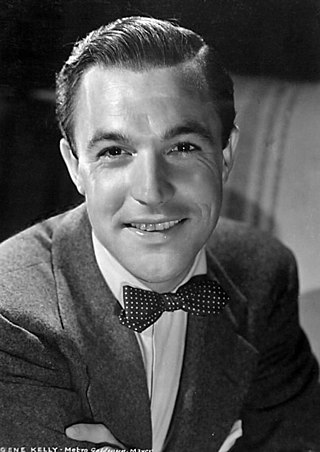
Eugene Curran Kelly was an American dancer, actor, singer, director and choreographer. He was known for his energetic and athletic dancing style and sought to create a new form of American dance accessible to the general public, which he called "dance for the common man". He starred in, choreographed, and, with Stanley Donen, co-directed some of the most well-regarded musical films of the 1940s and 1950s.

Adolph Green was an American lyricist and playwright who, with long-time collaborator Betty Comden, penned the screenplays and songs for musicals on Broadway and in Hollywood. Although they were not a romantic couple, they shared a unique comic genius and sophisticated wit that enabled them to forge a six-decade-long partnership. They received numerous accolades including four Tony Awards and nominations for two Academy Awards and a Grammy Award. Green was inducted into the Songwriters Hall of Fame in 1980 and American Theatre Hall of Fame in 1981. Comden and Green received the Kennedy Center Honor in 1991.
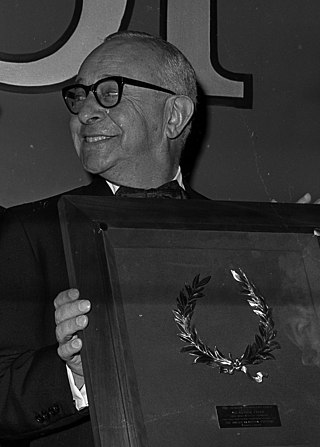
Arthur Freed was an American lyricist and a Hollywood film producer. He won the Academy Award for Best Picture twice, in 1951 for An American in Paris and in 1958 for Gigi. Both films were musicals, and both were directed by Vincente Minnelli. In addition, he produced the film Singin' in the Rain, the soundtrack for which primarily consisted of songs he co-wrote earlier in his career.
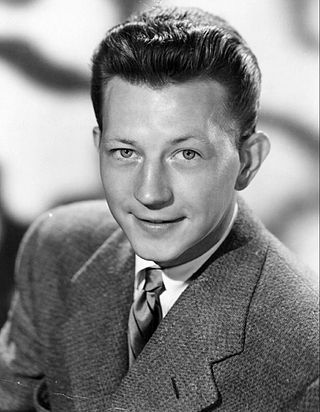
Donald David Dixon Ronald O'Connor was an American dancer, singer and actor. He came to fame in a series of films in which he co-starred, in succession, with Gloria Jean, Peggy Ryan, and Francis the Talking Mule.

Good Singin' Good Playin' is the eleventh studio album by American rock band Grand Funk Railroad. The album was released on August 2, 1976, by MCA Records.
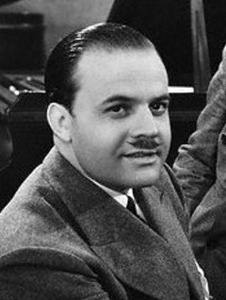
Ignacio Herbert "Nacio Herb" Brown was an American composer of popular songs, movie scores and Broadway theatre music in the 1920s through the early 1950s. Amongst his most enduring work is the score for the 1952 musical film Singin' in the Rain.

Orie Frank Trumbauer was an American jazz saxophonist of the 1920s and 1930s. His main instrument was the C melody saxophone, a now-uncommon instrument between an alto and tenor saxophone in size and pitch. He also played alto saxophone, bassoon, clarinet and several other instruments.
"Good morning" is a common greeting in the English language. It may also refer to:

"Singin' in the Rain" is a song with lyrics by Arthur Freed and music by Nacio Herb Brown. Doris Eaton Travis introduced the song on Broadway in The Hollywood Music Box Revue in 1929. It was then widely popularized by Cliff Edwards and the Brox Sisters in The Hollywood Revue of 1929. Many contemporary artists had hit records with "Singin' in the Rain" since its release, including Cliff Edwards, Earl Burtnett and Gus Arnheim in 1929 alone. It entered the American public domain on January 1, 2025.
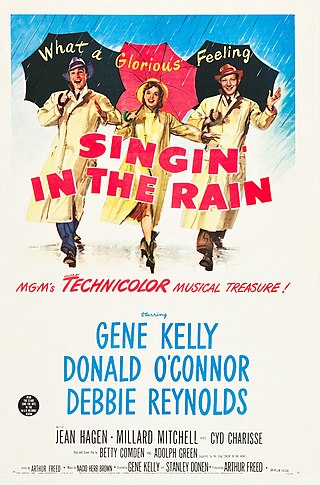
Singin' in the Rain is a 1952 American musical romantic comedy film directed and choreographed by Gene Kelly and Stanley Donen, starring Kelly, Donald O'Connor and Debbie Reynolds, and featuring Jean Hagen, Millard Mitchell, Rita Moreno and Cyd Charisse in supporting roles. It offers a lighthearted depiction of Hollywood in the late 1920s, with the three stars portraying performers caught up in the transition from silent films to "talkies".
Singin' in the Rain is a stage musical with story by Betty Comden and Adolph Green, lyrics by Arthur Freed, and music by Nacio Herb Brown. Adapted from the 1952 movie of the same name, the plot closely adheres to the original. Set in Hollywood in the waning days of the silent screen era, it focuses on romantic lead Don Lockwood, his sidekick Cosmo Brown, aspiring actress Kathy Selden, and Lockwood's leading lady Lina Lamont, whose less-than-dulcet vocal tones make her an unlikely candidate for stardom in talking pictures.
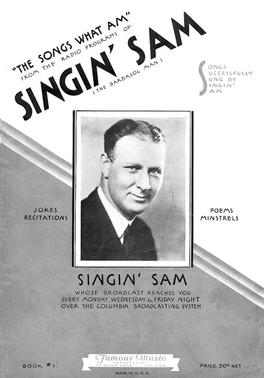
Singin' Sam aka Harry Frankel was a minstrel performer, vaudevillian and popular personality during the early days of radio. He was best known as "Singin' Sam, the Barbasol Man" for his long association with that company.
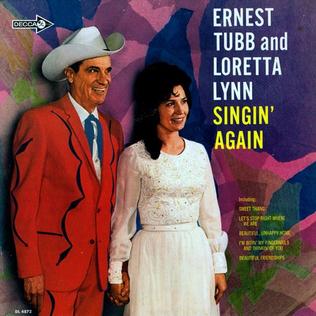
Singin' Again is the second collaborative studio album by American country music singers Ernest Tubb and Loretta Lynn. It was released on May 29, 1967, by Decca Records.

Willie – Before His Time is a 1977 album by country singer Willie Nelson. The album features songs previously recorded by Nelson during the 1960s and early 1970s, re-released in order to take advantage of the popularity he gained during the mid-1970s.
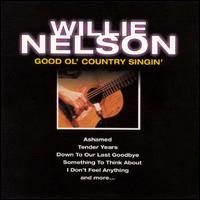
Good Ol' Country Singin' is a compilation album by country singer Willie Nelson, released on September 19, 2000.

Singin' and Swingin' and Gettin' Merry like Christmas is the third book of Maya Angelou's seven-volume autobiography series. Set between 1949 and 1955, the book spans Angelou's early twenties. In this volume, Angelou describes her struggles to support her young son, form meaningful relationships, and forge a successful career in the entertainment world. The work's 1976 publication was the first time an African-American woman had expanded her life story into a third volume. Scholar Dolly McPherson calls the book "a graphic portrait of the adult self in bloom" and critic Lyman B. Hagen calls it "a journey of discovery and rebirth".
Singin' in the Rain is a 1952 musical film. The title may also refer to:

"Singin' the Blues" is a 1920 jazz composition by J. Russel Robinson, Con Conrad, Sam M. Lewis, and Joe Young. It was recorded by the Original Dixieland Jass Band in 1920 as an instrumental and released as a Victor 78 as part of a medley with "Margie". The song was released with lyrics by vocalist Aileen Stanley in 1920 on Victor. In 1927, Frank Trumbauer, Bix Beiderbecke, and Eddie Lang recorded and released the song as an Okeh 78. The Trumbauer recording is considered a jazz and pop standard, greatly contributing to Frank Trumbauer and Bix Beiderbecke's reputation and influence. It is not related to the 1956 pop song "Singing the Blues" first recorded and released by Marty Robbins in 1956.

Andy Bennett , is an English singer and musician, best known for his work with Ocean Colour Scene.
Singing the Blues is a 1956 song written by Melvin Endsley and recorded by Marty Robbins.